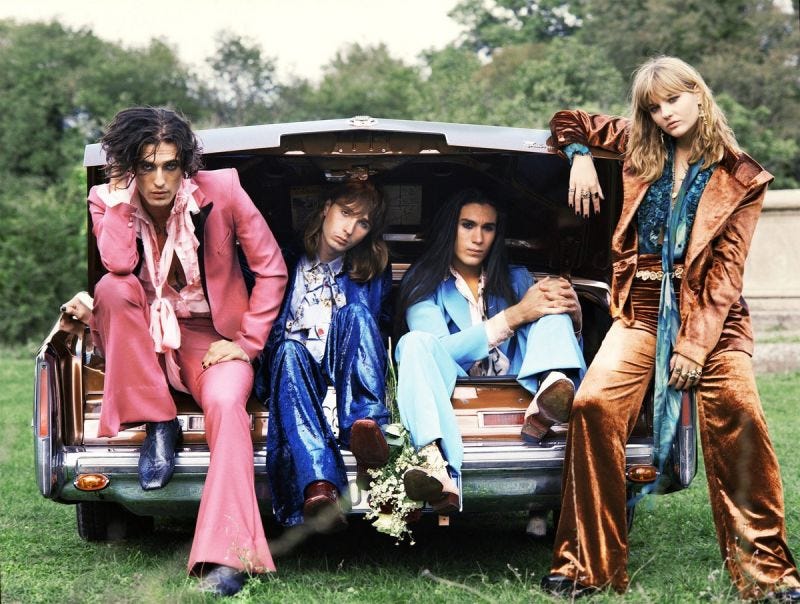
Måneskin (From left to right: David, Raggi, Torchio, and De Angelis pose for their latest album, Teatro d’aira). Photo by Francis Delacrox.
“It’s Måneskin,” lead singer Damiano David snarls into the studio mic for “Morirò da Re,” one of Måneskin’s many songs that catapulted them to commercial success in Italy. But in 2017, no one outside of Italy appeared to know who Måneskin was or what kind of music they performed. This is quite the contrast to the rock band’s present status of fame, where they now grace the electronic billboards of Times Square and are currently on the last leg of their sold-out European tour.
Yet fame has not changed the four members of Måneskin — Damiano David (vocalist), Victoria de Angelis (bassist), Ethan Torchio (drummer) and Thomas Raggi (guitarist). Spotify has recently named Måneskin the second most-listened-to band in the world, yet all four refuse to switch to “pop” sound and are staunchly dedicated to keeping classic rock alive for the people: one look at their discography and aesthetics makes this clear. Their musical and visual elements feel reminiscent of seventies bands, like Queen, Fleetwood Mac, and ABBA. Everything that Måneskin has, including De Angelis’s punchy bassline in “Niente da dire,” Torchio’s relentless drums in the Eurovision-winning “Zitti e buoni,” and David’s salacious flirtations while singing, all scream seventies rock. Their fans are acutely aware of the band’s love of this genre, to the point where some of their fans jokingly call them a sexier, kinkier ABBA.
Simultaneously, the band manages to include Italian elements in some of their songs, giving their discography a unique sound. Emotional songs like “Torna a casa’’ and “Coraline” use more acoustic instruments, similar to the sounds of Italian folk songs. Yet, the band still manages to keep the explosive energy of rock in these same songs. “Vent’anni”’ captures seventies rock by being a power ballad that relies on an electric guitar and bass, but people remember the song for its elegant-sounding and expressive Italian lyrics, particularly the line “Ma la strada è più dura quando stai puntando al cielo” (“But the road is harder when you’re heading for the sky”). Perhaps this is why Italy chose Måneskin to represent in Eurovision 2021: they dedicate much of their work to traditional Italian musicality.
But Måneskin started their career well before Eurovision. De Angelis, David, and Raggi formed the band in their high school days of 2015 and recruited Torchio after advertising that they needed a drummer for their group. The members then brainstormed the name Måneskin (Moonlight) for the band, but interestingly, it does not have any relation to the band’s musical style, aesthetic, or song material. During the brainstorming stage, De Angelis, who is half-Dutch, threw out several Dutch words for the band name, and the members happened to take a liking to the word Måneskin. Once they had the name, the members started to perform in many contests and cities, and frequently busked in the streets of Rome.
During 2017, the band participated in X-Factor Italia, covering songs like Four Seasons’ “Beggin” and The Killers’ “Somebody Told Me.” Though they did not win the competition, they gained significant recognition from their stint on the show and managed to find success afterward in their 2018 album Il ballo della vita. Their singles from this album, including “L’altra dimensione,” “Fear for Nobody,” and “Le parole lontane,” managed to dominate Italian song charts.
Though Måneskin took a break in 2019 to 2020, people refused to let them be forgotten. By 2021, Måneskin had become so well recognized that they won the Sanremo Music Festival, a well-known Italian television contest hosted in the city of Sanremo, with “Zitti e buoni,” one of the singles on their 2021 album Teatro d’ira. With the win, Italian authorities declared them the best candidates to represent Italy in Eurovision, an annual international song competition between artists from other European countries. Despite facing strong candidates like Go_A who performed “Shum,” a song that mixed Ukrainian folk and electro sounds, and Barbara Palvi with her French vocal ballad “Voilà,” Måneskin still managed to beat them all with “Zitti e buoni.” Their song scored almost a hundred points more than the artist in second place, Switzerland’s Gjon’s Tears.
Eurovision was the ultimate tipping point that catapulted the band into international stardom. People from many countries began to pay serious attention to Måneskin, as evidenced by the band’s cover of “Beggin” shooting to the top of Spotify’s Top 40 in America and countries like Ukraine and the United Kingdom putting tracks from Måneskin’s Teatro d’aira on their weekly charts. At this time, their recently released music video for “I Wanna Be Your Slave” sits at a whopping thirty-six million views, despite being released only a month prior. Each member’s face has now been displayed on billboards in Los Angeles, New York, and Berlin, while their European tour packed nearly every stadium that they performed in.
But all this fame has not intimidated Måneskin. Instead, they appear to embrace the praise and recognition and are aiming for even higher musical goals. They have recently collaborated with Iggy Pop, an incredibly influential punk and rock musician, for a second edition of “I Wanna Be Your Slave,” and are currently in their studios creating new music for their next album, which they may drop in 2022. As seen through their ongoing work and dedication to music, Måneskin blatantly refuses this era of success to be their peak. They seem determined to fulfill grander achievements, and we can only wait in great anticipation to see them do so. Måneskin’s music is available to stream on Spotify and Apple Music.